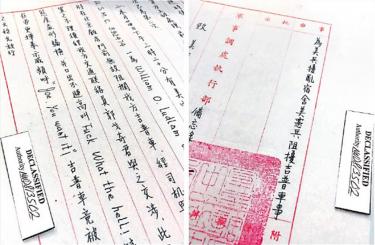A group of US-based activists has started searching the official archives of the US government and the UN for Taiwanese historical materials to publish them for free on the Internet.
Technology is the centerpiece of the project, as the software the group is developing would enable volunteers to scan and upload historical documents with their mobile devices, Lin Yu-Cheng (林育正), a project leader and a self-styled house-husband, said on Sunday.
Funded via the Web-based transparency activism platform G0V and other private sources, the Taiwan National Treasure initiative was formally launched at the New York G0V Hackathon event in September last year.
The initiative uses Facebook — via the page Taiwan National Treasure (國家寶藏) — to communicate with volunteers and donors.
The aim of the project is help Taiwanese gain a better understanding of their history by seeing the nation from the perspective of foreign governments through primary-source documents, Lin said.
The project’s leaders include tech entrepreneur Hsiao Hsin-cheng (蕭新晟) and assistant research professor of pharmacology at State University of New York Downstate Medical Center Abraham Chuang (莊士杰).
Since most of the volunteers are US-based, they are focusing on the depositories of the US National Archives and Records and Administration (NARA) and the UN Archives and Management Section (ARMS), Lin said.
When asked to comment on the project, Chuang said he had friends were affected by the wansei controversy that erupted last year.
He was referring to Chen Hsuan-ju (陳宣儒), who falsely claimed Japanese ancestry to promote her 2014 book Wansei Back Home (灣生回家) — written using the nom de plume Mika Tanaka — and a resulting documentary about Japanese born in Taiwan during the Japanese colonial era.
“Following the incident, my friends in New York and I began to wonder about the veracity of Taiwanese history — from the colonial period to the lifting of martial law — as it is told to us by textbooks, popular titles and the media. Who are the interpreters of Taiwanese history? Should we trust them uncritically?” Chuang said.
The Taiwan National Treasure initiative is a long-term project aimed at collecting important historical documents about Taiwan that are in foreign archives, guided by open data and democratic participation, he said.
Volunteers, including professional historians, have visited the National Archive in College Park, Maryland, in search of declassified documents about Taiwan, tens of millions of which are believed to be in the collection, he said.
The College Park depository, which is close to Washington, collects and stores documents flowing into the US government in the Washington area.
The records range from intelligence reports, records on Taiwan’s geography and hydrography and complications of statistics and surveys gathered from the Taiwanese media during the 1950s, to reports on Taiwanese literary figures, he said.
While some documents might repeat familiar findings, more data must have derived from the original collection efforts by the US government that promise new insights into Taiwanese history, he said.
Some of the data is likely to diverge from the accounts of Taiwanese authorities or interpret events from an outside perspective, with assessments that are likely to be more objective at times, Chuang said.
A mobile app — described as a work in progress — is aimed at helping volunteers digitize documents and transform them into an open data resource, which would help other people and institutions who are researching Taiwanese history, he said.
Volunteers are making regular research trips to the National Archive and the UN ARMS office in New York, Chuang said.
Source: Taipei Times - 2017/07/11





















